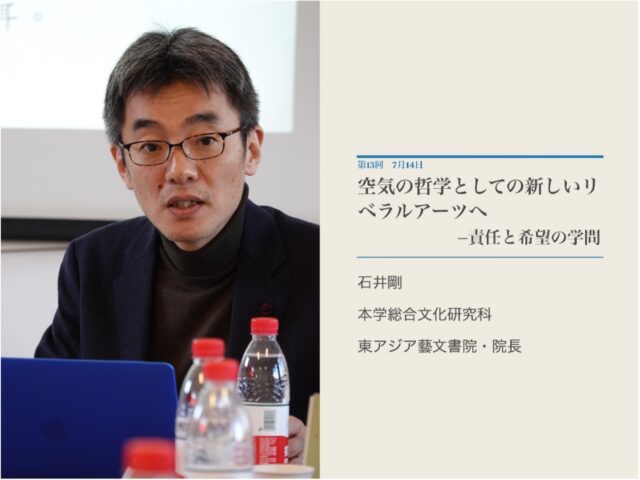On July 14, the last session of this year’s Academic Frontier Lecture Series was delivered by Prof. Tsuyoshi Ishii, EAA Director and long-time coordinator of the project. His talk focused on the possibility of “a philosophy of air,” drawing inspiration from his own field of study: Chinese philosophy.

The lecture began by offering a look at the idea of “value” from the point of view of language. With reference to David Graeber, Prof. Ishii defined value as a system of “meaningful difference” and connected it with Zhuangzi’s philosophy of the equalization of all things based on their difference (qiwulun, 斉物論). But can such equality truly be possible, especially in the face of continuously worsening climate change? With this question in mind, Prof. Ishii developed his argument on the “politics of air” in view of the precarious conditions of the Global South, calling for a redistribution of resources or, in other words, a radical democratization of air. He then advocated for the need of a different value system, or a new system of meaningful difference, a new “story” of sorts, one that would not simply reproduce the inequalities of the past but would instead base itself on the idea of a “radical centeredness.”

Yet when it comes to the creation of new stories, certain issues inevitably emerge—for example, the issue of how we treat the Other. In fact, this was brought up by one of the students during the Q&A session.
It is here that this author thought of Mikhail Bakhtin and his unique ideas about polyphony in literature and the role of the Other. In looking at Dostoevsky’s work, Bakhtin proposed the presence of “a plurality of independent and unmerged voices and consciousnesses,” which in turn produce “a genuine polyphony of fully valid voices”. This view is not unlike Zhuangzi’s concept of tianlai (天籟), or “heavenly sound,” which was introduced at the beginning of the lecture. What is more, a basic characteristic of the polyphonic novel is that the “plurality of consciousnesses, with equal rights and each with its own world” is not simply blended together by the will of a single author but is instead combined “in the unity of the event.” That is to say, the “extra-plot unity” of “fully valid voices” is achieved by means of the “event” itself (Problems of Dostoevsky’s Poetics. University of Minnesota Press, 1984).

When imagining a new value system, a new story, or even a new type of scholarship compatible with the plurality of our world, perhaps it would be more than worth it to consider the importance of such “eventness.” Come to think of it, perhaps the university itself might just be considered one such “event.”
Report by Viktoriya Nikolova (EAA Research Assistant)








